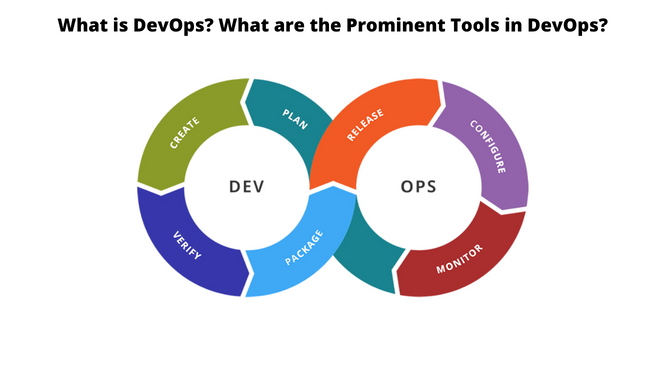Introduction to DevOps:
DevOps is the fastest growing field in the IT the Software Development process. DevOps strategies help to speed up the enterprise’s software/application development process by automating the entire delivery lifecycle and by enhancing communication and collaboration between the IT development and operation teams. DevOps can be termed as a culture shift implying which organizations can deliver software faster and more reliably.
As the world of business changes and becomes more complex, the need for DevOps grows. But what is DevOps? In simple terms, DevOps is the combination of people, processes, and technology to produce better software faster. The benefits of DevOps are many. Perhaps the most important is that it helps businesses avoid the “fail fast, fail often” mentality that can lead to success. Instead, DevOps allows businesses to experiment and learn quickly without the fear of failure.
The DevOps movement started in the early 2000s, when a group of forward-thinking software developers began to advocate for a more collaborative and iterative approach to software development. The members of this group have come to a conclusion that by simply automating the software delivery process and by improving communication between the cross-functioning teams in the IT development process, they could speed up the software development process. They also believed that this approach would also improve the quality of the software that is being released.
What is DevOps?
DevOps can be interpreted as a set of practices that sets in focus on improving the collaboration and communication of the cross-functioning teams in the software delivery process while automating the process of software delivery. It emphasizes making the software development and IT operation teams work independently towards achieving shared goals and responsibilities. DevOps strategies help enterprises to rapidly produce software products and services. By integrating DevOps strategies and by automating the software delivery process, companies are able to decrease the time taken between writing code and deploying it to production.
DevOps implementation isn’t simply about implementing a single tool or technology. It is a set of practices that emphasizes the collaboration and communication of both software developers and other IT professionals. Puppet, Chef, Ansible, etc. are among the most extensively used tools in the DevOps ecosystem. With the help of these tools, it becomes easy to automate the process of provisioning, configuring, and managing servers. Other popular DevOps tools include Jenkins and Travis CI. These tools are used to automate the process of building, testing, and deploying software.
The Surge in the Demand for DevOps:
There is constant surge in the demand for DevOps in recent years as more and more organizations have adopted DevOps practices. A recent survey by Puppet found that 72% of organizations surveyed were using or considering using DevOps practices. If you wish to learn DevOps and excel in a career in this field then joining DevOps Training in Hyderabad course by Kelly Technologies will be a smart choice.
What are Prominent Tools in DevOps?
There are a wide variety of DevOps tools available to help streamline your workflow and increase efficiency. Here are some of the most popular DevOps tools:
- Puppet
Puppet is a configuration management tool using which it becomes easily to automate provisioning and configuration of servers. It helps you manage your infrastructure as code, making it easy to keep your servers in sync and avoid configuration drift.
- Chef
Chef is also a widely used configuration management tool for automating provisioning and configuration of your servers. Like Puppet, it helps you manage your infrastructure as code and keep your servers in sync.
- Ansible
Ansible is a configuration management tool as well, but it differs from Puppet and Chef in that it is agentless. This means that you don’t need to install any agent software on your servers in order to use Ansible.
- Jenkins
Jenkins is a continuous integration (CI) tool that helps you automate the build, test, and deploy process. It allows you to easily create pipelines to build, test, and deploy your code.
- CircleCI
CircleCI is another popular CI tool that helps you automate the build, test, and deploy process. It also offers a convenient web interface that makes it easy to monitor the status of your builds and deployments.
- AWS CodePipeline
AWS CodePipeline is a CI/CD tool from Amazon that helps you automate the build, test, and deploy process for your applications that are deployed on AWS.
- Azure DevOps
Azure DevOps is a CI/CD tool from Microsoft that helps you automate the build, test, and deploy process for your applications that are deployed on Azure.
- Google Cloud Build
Google Cloud Build is a CI/CD tool from Google that helps you automate the build, test, and deploy process for your applications that are deployed on Google Cloud Platform.
- Travis CI
Travis CI is a CI service that helps you automate the build, test, and deploy process for your open-source projects.
- GitLab CI
GitLab CI is a CI/CD tool that is integrated into the GitLab code hosting and project management service. It helps you automate the build, test, and deploy process for your applications.
What are the Benefits of DevOps?
DevOps has not just one but several benefits, which include:
- Increased Speed to Market:
By deploying DevOps strategies, enterprises can now release software faster and more reliably. The speed and agility benefits of DevOps come from the fact that it automates many of the processes involved in software delivery and infrastructure changes. This means that changes can be made and deployed much faster than if these processes were done manually.
- Improved Communication and Collaboration
DevOps promotes improved communication and collaboration between the cross-functioning teams in the software delivery process.
- Improved Quality:
DevOps helps organizations deliver software with fewer bugs and more features. The improved quality benefits of DevOps come from the fact that automated testing and deployment can find and fix errors much faster than if these processes were done manually.
- Increased Collaboration
The increased collaboration benefits of DevOps come from the fact that it encourages communication and collaboration between software developers and other IT professionals. This collaboration can help to identify problems and find solutions much faster than if each team worked independently.
- Increased Customer Satisfaction:
DevOps helps organizations deliver software that meets customer expectations.
Growing demand for DevOps Jobs:
There’s no doubt that the demand for DevOps jobs has grown exponentially in recent years. With the rapid growth of the DevOps movement, it’s no surprise that there is a growing demand for DevOps jobs.
However, the supply of DevOps talent has not kept pace with the demand. According to the Forrester study, only 10% of organizations have the necessary DevOps skills and knowledge in-house.
Conclusion:
This article in the Guest Can Post must have given you a clear idea of the DevOps industry landscape. At present, there is a huge opportunity for those with the right skills and experience to get in on the ground floor of this rapidly growing field. If you’re looking for a career change or just want to get in on the DevOps revolution, now is the time to start honing your skills and experience.




